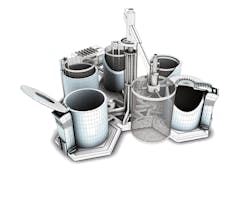Henkel has installed three of its LOCTITE® Circular Impregnation Systems for North American manufacturers seeking sealing for metal parts with an "environmentally friendly" five-step process.
Vacuum impregnation seals defects that form in molten metal as it solidifies during molding, defects that may include microscopic pores and leak paths in casting walls. A resin material fills the cracks or voids without changing a casting’s dimensional or functional characteristics.
Impregnation is particularly important for aluminum alloy castings, and demand for the process has expanded with the increases in production for high-pressure diecastings for automotive applications. Henkel noted the process is also used to seal electronics parts against fluids, gases and other external influences.
Henkel’s Transport & Metals business is part of its Henkel Adhesive Technologies unit, one of three operating in North America for the industrial and consumer products group. Two of the vacuum-based LOCTITE systems are in place at the Henkel location in Muncie, IN, and a third is installed in Lincolnton, NC. Two more are scheduled to be installed later this year in Franklin Park, IL, and Monterrey, Mexico later this year.
The Circular Impregnation System seals parts using a five-step process that, according to the developer, reduces water usage by extracting and recycling excess resin so that the water can be reused, all while maintaining current productivity rates. Henkel claims it has reduced water usage up 90% (saving on average 6,300 gallons of water/week.)
“Our fully automated impregnation machines enhance quality control, reduce human error and deliver significant environmental and sustainability benefits,” stated Scott Simmons, business development manager. “Through recycling excess resin, we can maintain water quality for a much greater period of time, reducing the amount of water that needs to be sent to water treatment facilities each week.”
In addition to conserving process water, the system makes water-treatment more efficient, reduces production downtime (for changing water), and minimizes the consumption of the resin sealant.
